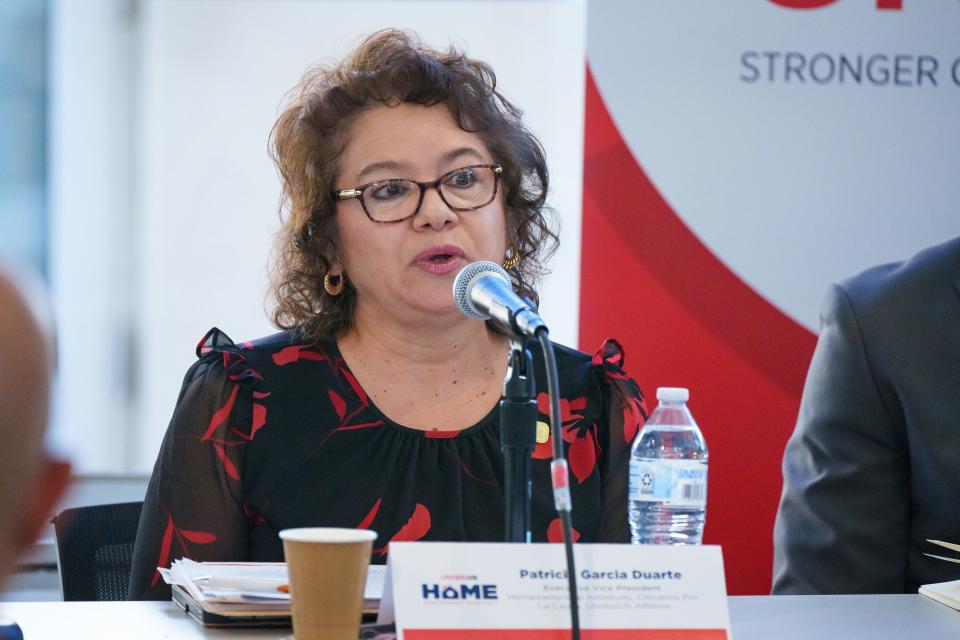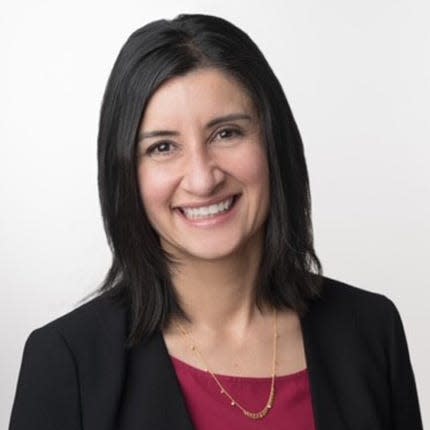Her parents were homeowners on a meager salary. How does Arizona ensure that now?
Visiting her parents in Somerton, Patricia Garcia Duarte often finds herself admiring the nopales and citrus trees in their backyard — trees her father planted decades ago at the home he built brick-by-brick and modified over the years.
For three decades, Patricia has been a fearless advocate for homeowners and today leads Chicanos Por La Causa, a historic Arizona nonprofit with credentialed housing and financial services programs.
She understands at a deep level the kinds of barriers Latino families face when it comes to buying a home.
They were poor but owned their home

Growing up, her parents had little money. Her father worked in the lettuce fields — a seasonal job that resulted in periods of unemployment and for whom no bank would have granted a mortgage.
Thanks to her mother’s ability to stretch their dollar, her father’s construction skills and a trusted connection who offered a rent-to-own deal for two plots of land, Patricia’s parents have their home today.
Patricia’s parents, now in their 80s, still live in this house and never had a mortgage. She thinks about what would have been different had they been renters on a $20,000-a-year income.
Homeownership remains the primary driver of household and generational wealth for American families, but not all Latino families are as fortunate as Patricia’s when it comes to achieving homeownership.
Systemic barriers to access have widened racial and wealth gaps.
How do we create Latino homeowners?
First-time home buyers today face an even tougher set of challenges — including one of the most competitive markets in history.
Housing stock is in low supply, causing prospective homebuyers to grapple with a highly competitive market and high prices.
To address some of these challenges with the long-term in mind, UnidosUS launched the HOME (Home Ownership Means Equity) initiative to create 4 million new Latino homeowners by 2030.
It entails a $100 million fundraising effort and investments in five initial test markets, including Phoenix.
Despite many challenges, we are also seeing positive momentum, driven by an effective combination of community-based nonprofit work, advocacy, private sector partnerships and government support.
Why Phoenix is a perfect test market
For eight years in a row the Latino homeownership rate has increased.
From 2016 to 2018, the number of Latino homeowners in the Phoenix metro area increased by more than 13%, nearly three times that of non-Latinos.
To achieve our goals, UnidosUS is tapping organizations like the one Patricia leads, CPLC, to support homebuyer readiness, expand credit access and increase housing supply.
Latino spending power: Is growing exponentially
We are also focused on preserving homeownership, including by modernizing lending rules, diversifying language access, allowing increased density through zoning reforms, boosting supply for first-time homebuyers, supporting construction labor force, and providing consumer education and housing counseling.
Our approach recognizes there is no one-size-fits-all solution.
It’s no accident that we are focusing on Phoenix. With a large and growing Latino population and steady economic momentum, the city and broader state of Arizona should be leading the way on Latino homeownership.
Efforts can bolster economy, add security
While Arizona has some of the toughest market conditions for Latinos in the country, primarily due to low inventory of affordable housing, real solutions are on the table.

Just over a year ago, CPLC announced they received a mortgage banker’s license as part of a new effort to support prospective homeowners in every step of the homebuying process — starting from an initial housing counseling session all the way to reviewing, approving, and providing a mortgage loan.
Earlier this year, Sens. Mark Kelly and Kyrsten Sinema announced more than $6 million for low-income Arizonans through the Housing and Urban Development Department’s Housing Trust Fund.
At our recent HOME initiative kickoff with CPLC, Kelly’s state director acknowledged not just the systemic barriers to Hispanic homeownership, but also the potential for Phoenix to serve as a perfect market for investment.
It’s estimated that by 2040, 70% of new homeowners will be Latino. It is critical we meet this growing cohort of Americans where they are at.
This trend not only has the potential to help erode historic inequalities, but it will also strengthen our economy and build security for more families like Patricia’s.
With meaningful investment and real action to break down systemic barriers, Arizona’s housing market is ripe for opportunity — not just for Latinos but for all Americans.
Laura Arce is senior vice president for Economic Initiatives at UnidosUS, a Latino civil rights and advocacy organization. She leads the UnidosUS Home Ownership Means Equity initiative. Reach her at larce@unidosus.org.
This article originally appeared on Arizona Republic: How does Phoenix make more Latinos homeowners in this market?

